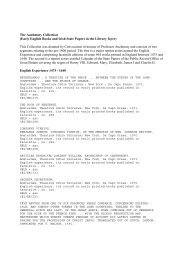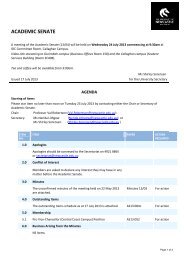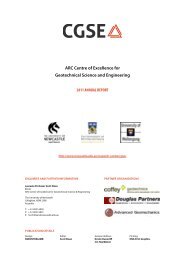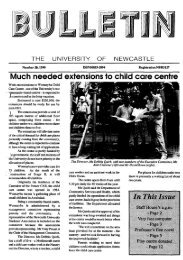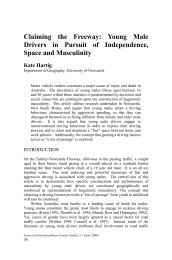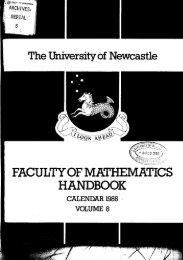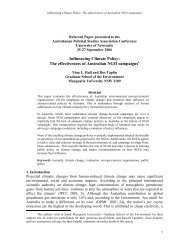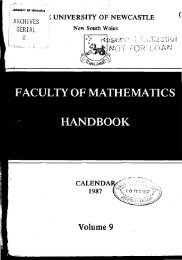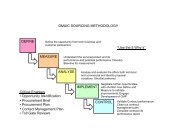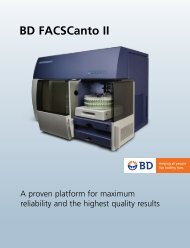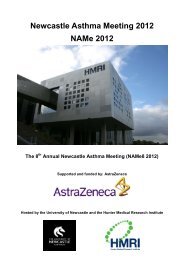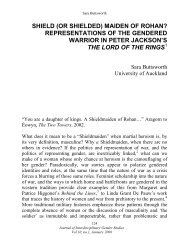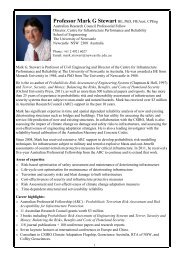n - University of Newcastle
n - University of Newcastle
n - University of Newcastle
Create successful ePaper yourself
Turn your PDF publications into a flip-book with our unique Google optimized e-Paper software.
40 AX ACSTRALIAX LASGGAGE.<br />
10. ADVERBS.<br />
There are numerous aclvcrbs in the language, but the most<br />
common are :-<br />
Adee~bs <strong>of</strong> Ti'iilze.<br />
Grekkald, ' to-morrow.'<br />
Palli, ‘ while,' ' by-and-by.'<br />
Gurintand, ' <strong>of</strong>ten.'<br />
R~UTTU~, ‘ a long time ago.'<br />
Hik, ' now.'<br />
Ugunuk, ' when ' (relative).<br />
ICaldan, ' a long time.'<br />
Knrlo, ' to-clay.'<br />
I17ataggrau, ' yesterday.'<br />
Paral, ' when ' (interrogatire).<br />
Tun, 'by-and-by.'<br />
AJcerbs <strong>of</strong> .iiTegntiolz.<br />
Nowaiye, ' none.'<br />
No~vaiye ellin, ' no more.' Tarno, ' no '; ' not.'<br />
Tarnalin, ' not yet.'<br />
Tauo, ' don't ' (imperati\-e).<br />
Tarno el, ' clon't' (do it).<br />
Tarnalo, ' no inore '; ' nerer.'<br />
Adverbs <strong>of</strong> Place.<br />
Ainu, ' by (at) that place.' Yak, yauo, ' where to.'<br />
Sklii, dye, alyikke, ' here.' Pa@, ' where'?<br />
,tlyenik, ‘ this place here.' Tagalli, ' where is he'?<br />
Euzru, ‘ where ' (relative). Tarnd, 'whence'?<br />
ICn-un, ' far <strong>of</strong>f.'<br />
Tarnd inde, ' whence thou'?<br />
Ondu, ' over there.'<br />
Tarnd ande, ' vhither thou'?<br />
l?xccnzl~les <strong>of</strong> the use <strong>of</strong> Adverbs.<br />
Yak a1 incle tantani, '--here will you sleep'; gurlug aiau,<br />
' at-the-place-where the hill ' (is) ; manti kiuau tantani ap,<br />
' the hut where I shall sleep '; gap tagulun ku-un, ' I stand far<br />
<strong>of</strong>f'; kegk tagulun ku-u, 'they two stand far <strong>of</strong>f'; liar<br />
tagulun kuar-un, 'they stand far <strong>of</strong>f.'<br />
The word wuny e, 'then,' usually coalesces with the pronoun<br />
or verb-sign which follows it ; as, wun y ap, ' then I '; wunyar,<br />
'then they1; wunyel itye, 'then will he.'<br />
The norcls uk, ukke, luk, lun, 'so,' 'thus,' denote rese~~zbln~~ce;<br />
as,lnk u0.r lun u, 'so,' 'thus'; lug itye yarnin, 'thushespeaks';<br />
11111 ellin, ' so being,' i.e., ' like '; luk u gge, ' like this one ';<br />
hikkai ukke, ' this may '; hi1 amb uk, ' for this may,' i.e., 'beecause<br />
'; lun uk, ' thus '; go uk ap, ' I go so.'<br />
The word amb y may be translated either ' instead cf ' (preposition)<br />
or 'because' (conjunctioil) ; as, kaldau amb, ' for a long<br />
time'; hi1 amb uk, 'because'; pinyatowe altl anlb anaipeibcrri<br />
means 'sugar for my tea'<br />
11. NOTES ON SYNTAX.<br />
1. The form <strong>of</strong> the verb is constant in its mood and tenses ;<br />
ollly the pronoun-subjects vary.<br />
- ,<br />
THE XARRISTE21 DIALECT. 'k 1<br />
8. The postpositional suffixes to pronouns are all:-ays attachecl<br />
to the accusative case ; as, kan-ail:, ' to them.'<br />
3. Pronominal acljectires are a!\:-ays r'eclined with their :-,ouns ;<br />
as, kin-an y ir-agk t ald u in nncl-ak l;, ' to his house '; all& so :dso<br />
hililiai korn, 'this man,' harnalcar kornar, ' tliese men';<br />
ornagk nnggugai, 'in that day.'<br />
4. Ths clirninutive is ylacccl after tile case-ending <strong>of</strong> the noun ;<br />
as, porl-alcl-01, ' <strong>of</strong> a little child '; porl-ar-01, ' <strong>of</strong> little chilclren.'<br />
5. IVhen an acljective and its noun are declined together, tlit.<br />
case-encling is attached only to the arljectil-e ; nu &gar-ald lioril,<br />
'<strong>of</strong> a gooel man.'<br />
6. The post-positioil -u ra m 13, ' for the purpose <strong>of</strong>,' is nl~r-nys<br />
attached to any vzrb mltich is put in the infinitive by anotller<br />
verb ; as, yempir i! anaSli nalckari tali-~~ail~b, 'he prc me<br />
a cluck to eat.'<br />
12. FORUATIOX OF 1I-02~~.<br />
This is effected by arlcling on various terminations, sollie <strong>of</strong> \~Iiich<br />
have alreacly been noticed :-<br />
(1) -wallin, 'being '; as, pilgeru-~s-allin, ' greedy.'<br />
(8) -warin, ' making'; as, ko&l;-u-1;-arin, 'sendhlg a-my from,'<br />
from 1x0 gk, ' apart '; ana gb-mar in, 'preperinp,' ' getting rencly '<br />
(lit., 'making towards it'), from anagli, liailngk, it~anagk, the<br />
clatire <strong>of</strong> the pronoun it y e.<br />
(3) -at y eri, ' belongillg to '; as, 1ao:m-aty eri, 'TI-CO~ for n fire,'<br />
from lammin, ' carrying on the back.'<br />
13. LIST OF PP,EPOSITIOSS, ADI-E~~s, kc.<br />
T ~ prepositions E are used as postpositions ; those words which<br />
in this list are preceded by n hyphen are used as affixes.<br />
Above-kerau, kizth. j An-ay froin here- -andel



